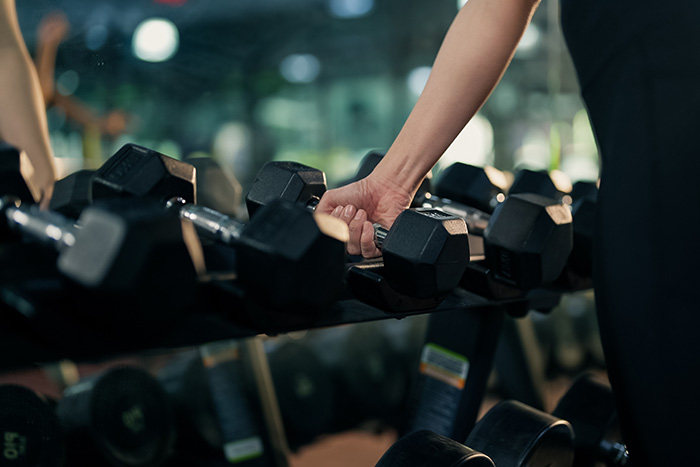Starting or returning to the gym can feel overwhelming, especially if you’re unsure where to begin. Gym anxiety is common, but with the right mindset and preparation, you can feel confident walking through those doors. This guide is designed to help beginners and those getting back into working out make fitness a more welcoming experience.
Understanding Gym Anxiety
It’s normal to feel intimidated when starting something new, and the gym is no exception. Common reasons for gym anxiety include:
- Fear of being judged.
- Not knowing how to use equipment.
- Feeling out of place among seasoned gym-goers.
The first step to overcoming this is acknowledging that many others feel the same way. Most gym members are focused on their own routines and not on what others are doing. Recognizing this can help reduce self-consciousness.
Start Small and Set Goals
You don’t need to dive into intense workouts right away. Instead:
- Begin with short sessions, such as 20-30 minutes, a few times a week.
- Set specific, achievable goals, like walking a mile on the treadmill or learning one strength exercise.
- Celebrate small wins to build momentum and confidence.
Do Your Research Ahead of Time
Familiarizing yourself with the gym environment can ease nerves. Try:
- Watching YouTube videos or reading articles about gym etiquette and how to use equipment.
- Visiting the gym during off-peak hours for a quieter, less intimidating experience.
- Taking advantage of gym tours to understand the layout and available resources.
Start with Home Workouts
Building confidence with home workouts can be a great stepping stone before going to the gym. At home, you can:
- Practice basic exercises like squats, lunges, push-ups, and planks.
- Follow beginner-friendly workout videos on platforms like YouTube.
- Use minimal equipment, such as resistance bands or light dumbbells, to familiarize yourself with strength training.
- Develop a routine and build endurance at your own pace.
Starting at home allows you to focus on your form and progress without distractions, helping you feel more prepared and confident when you transition to the gym.
Bring a Buddy
A workout partner can make the gym feel less intimidating and more enjoyable. A friend can:
- Help you stay motivated and accountable.
- Provide moral support and share in the experience.
- Make the gym feel like a shared activity rather than a solo venture.
Dress for Confidence
Wear clothing that makes you feel comfortable and confident. Whether it’s your favorite leggings or a loose-fitting T-shirt, the right outfit can help you feel at ease. Remember, gym-goers are typically focused on their own workouts, not critiquing others’ attire.
Start with Familiar Activities
Ease into your fitness journey by starting with activities you’re comfortable with, such as:
- Walking or jogging on the treadmill.
- Using a stationary bike or elliptical.
- Trying bodyweight exercises like squats, push-ups, or planks.
- Joining beginner-friendly group fitness classes to follow a structured workout with guidance.
Use Resources Available
Most gyms offer resources to help beginners feel more comfortable, such as:
- Free orientations or introductory sessions with a personal trainer.
- Workout plans tailored to beginners.
- Apps or online programs that provide step-by-step exercise instructions.
Practice Self-Compassion
Being kind to yourself is key. Remember:
- Just showing up to the gym is a victory.
- It’s okay to make mistakes or feel unsure; every expert was once a beginner.
- Focus on progress, not perfection, and celebrate every step forward.
Beginner Workout Suggestions
For those unsure where to start, here are some simple workout ideas:
- Cardio: Walk or jog on a treadmill for 20 minutes at a comfortable pace or try the elliptical for a low-impact option.
- Strength Training: Begin with machines, as they guide your movements. Try leg presses, chest presses, or seated rows.
- Bodyweight Exercises: Start with 2-3 sets of 10-12 reps of squats, lunges, or modified push-ups.
- Stretching and Mobility: End your workout with 5-10 minutes of stretching to improve flexibility and reduce soreness.
Final Thoughts
Overcoming gym anxiety takes time, but with preparation and a positive mindset, you’ll find your confidence growing with each visit. Focus on your own journey, set realistic goals, and remember: everyone starts somewhere. You’ve got this!
Are you ready to reach your fitness goals but not sure where to start? We’re here to help. Receive personalized guidance and motivation from our expert team. Our quick and easy fitness assessment provides valuable insights into your health and overall wellness. Achieve your fitness goals faster with the help of our certified fitness specialists.
What’s Included:
- Resting Heart Rate and Blood Pressure Readings
- BodyScript™ Body Composition Analysis
- Flexibility and Functional Movement Tests
- Strength and Cardiovascular Analysis and More
For more information or to schedule a fitness assessment, please contact us here.

